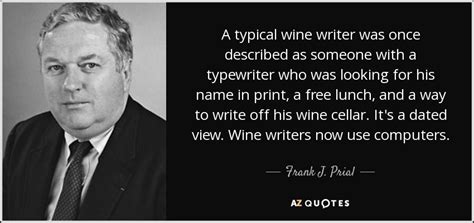A Quote by Meghan Markle
The name 'The Tig' comes from a wine called tignanello, and the first time I had a sip of this wine, it was such an 'aha' moment. I finally understood what people were talking about when they spoke about the body, the legs or structure of wine.
Related Quotes
Upon the first goblet he read this inscription, monkey wine; upon the second, lion wine; upon the third, sheep wine; upon the fourth, swine wine. These four inscriptions expressed the four descending degrees of drunkenness: the first, that which enlivens; the second, that which irritates; the third, that which stupefies; finally the last, that which brutalizes.
There's always a wine bully. The one person who did read the 'Wine Spectator,' who tells you what to drink and why the '97 is better than the '98. I want to punch the wine bully in the face. I want to make sure this generation of wine drinkers isn't elitist and snotty. I want it to be about family and bringing people together.
One of the most insidious myths in American wine culture is that a wine is good if you like it. Liking a wine has nothing to do with whether it is good. Liking a wine has to do with liking that wine, period. Wine requires two assessments: one subjective, the other objective. In this it is like literature. You may not like reading Shakespeare but agree that Shakespeare was a great writer nonetheless.
When I find someone I respect writing about an edgy, nervous wine that dithered in the glass, I cringe. When I hear someone I don't respect talking about an austere, unforgiving wine, I turn a bit austere and unforgiving myself. When I come across stuff like that and remember about the figs and bananas, I want to snigger uneasily. You can call a wine red, and dry, and strong, and pleasant. After that, watch out.
...stories about [the German composer Johannes] Brahms's rudeness and wit amused me in particular. For instance, I loved the one about how a great wine connoisseur invited the composer to dinner. 'This is the Brahms of my cellar,' he said to his guests, producing a dust-covered bottle and pouring some into the master's glass. Brahms looked first at the color of the wine, then sniffed its bouquet, finally took a sip, and put the glass down without saying a word. 'Don't you like it?' asked the host. 'Hmm,' Brahms muttered. 'Better bring your Beethoven!'



































